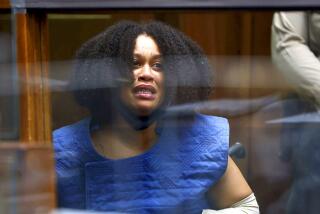Dealing with a measure of blame and grief
You canât help but hurt for the family of Conor Lynch. The 16-year-old Notre Dame High School student was struck by a car and killed last week as he jogged across a busy Sherman Oaks street with teammates headed to cross-country practice.
Conor was âthe perfect kid,â a grieving aunt said at his curbside shrine. Hundreds mourned Monday at his funeral Mass. Cardinal Roger Mahony sent condolences, calling his death âa terrible tragedy.â Conorâs handsome face, displayed on posters and TV screens, only magnified the tragedy.
But there was another image from that week that moved me unexpectedly: A bystanderâs account of 18-year-old Moran Biton sobbing on a curb at the accident scene.
Biton is the driver of the SUV that left Conor dead in the street. She did not stop when she hit him, witnesses said, but drove on for four blocks, pulled alongside a parked police car and told officers âI think I hit someone.â
She was arrested, then freed on $50,000 bail. Police are still investigating whether to seek felony hit-and-run charges.
Her failure to stop could be read as an act of cowardice and cruelty. But it could also reflect the sheer panic of a frightened teen. This is a tragedy with messy divisions of blame and grief.
âIt seems clear the boy made, literally, a fatal mistakeâ when he stepped off the curb into traffic mid-block, an LAPD traffic officer told me when I called to talk about it. Still, âwhen youâre the driver involved, you stop immediately and you render aid, whether or not the accident could have been avoided.â
Biton might not have been able to prevent the collision. But her decision to drive off turned an accident into a criminal case and the teenage driver into a villain.
Why she kept going, we canât know. Maybe her music was so loud that she really didnât hear the thump of the collision. Or maybe she did, and it terrified her. Maybe she thought she could erase the moment if she just ignored it and kept on going.
How do you wrap your mind around the idea that you may have just killed someone? I wanted to know, so I called a man who has carried that burden for half his life and written a memoir, âHalf A Life,â about it.
It was 1988. Darin Strauss, then 18, was heading for a game of miniature golf with friends when a bicyclist pedaling along the shoulder of the road wobbled, swerved across two traffic lanes and wheeled into the path of his Oldsmobile.
The girl he hit was 16, a high school classmate in suburban Long Island. She died that night in a hospital.
His recollection of the moment that shaped his life begins with this bewildering image: âDark blond hair appeared very clearly in my windshield. I remember a kind of mechanical curiosity about why this was happening and what it might mean.â
He noted âthe peculiar stillnessâ of the girlâs pale face; her body sprawled unconscious on the pavement. âBut I still didnât think there was any reason to freak out,â he wrote. âI can only explain it like this: There was still a disconnect between me and the realness of what was happening.â
The book is painfully raw and beautifully written. Strauss is a heralded novelist and a writing professor at New York University. It took him more than 20 years to write about the accident. âIt was a secret I had,â he said. âI didnât want anyone to know.â
The birth of his twin sons changed his mind. âI decided I needed to examine what happened.â
Strauss wasnât drunk or speeding or inattentive. Witnesses, police and the girlâs biking partner all publicly absolved him of responsibility. But blame and guilt are not the same.
âPeople said âYouâre not at fault, so youâre fine.â But I went off to college and I wasnât fine.... I spent a lot of time being really hard on myself.â
He was ambushed by memories at random moments. He spent years trying to pay off his cosmic debt by living a life good enough for two. By 28, he had gray hair and heâd had stomach surgery for stress-related ailments.
I asked him to stand in Bitonâs shoes. Could he imagine fleeing the accident scene? âI donât know the girl or the circumstances. And Iâm very sensitive to questions of guilt,â he said. âItâs just very surreal when it happens.â
He tried to explain what his accident felt like: âI still remember the thud. I thought I had dinged up my dadâs car.... I thought maybe I broke the girlâs arm. It didnât register that she could be dying.â
There was silence on the phone line for a moment too long.
âAs I said it to you, I heard that thud again,â Strauss said. âItâs something I never get over.â
But not everyone breaks up over a traffic fatality. âSome people are as cold as ice,â said Chris Laurino, an LAPD detective investigating Conorâs death. âIâve interviewed people who just said âWell the person was old,â like the death didnât matter.â
Laurino knows from experience how hard it is in a traffic case to make the punishment fit the crime.
âWhen I was 9, I had someone knock on my door and tell me my dad was killed in a traffic accident,â he said. The woman who hit him had run a red light.
âI hoped she would pay a price comparable to what my family paid. She got six monthsâ probation and her life continued. Our lives were totally shattered,â he said.
The Lynch familyâs life is shattered now, and people who know Biton worry that her life may be shattered too.
âPeople are trying to paint this like sheâs some cold-hearted killer,â said Dimitri Christy, the assistant principal at CHAMPS, a Van Nuys charter high school that Biton once attended. âI think she was terrified and didnât know what to do.â
His students include Bitonâs friends and Conorâs buddies from middle school. âItâs been a very difficult week,â Christy told me. âSome kids are very close to the boy and very distraught.... Weâre trying to talk to them about safety issues. Because when this fades, theyâll feel invincible again.â
And no matter which way the legal system leans, they will probably always remember Biton as the hit-and-run driver who killed the perfect kid.


